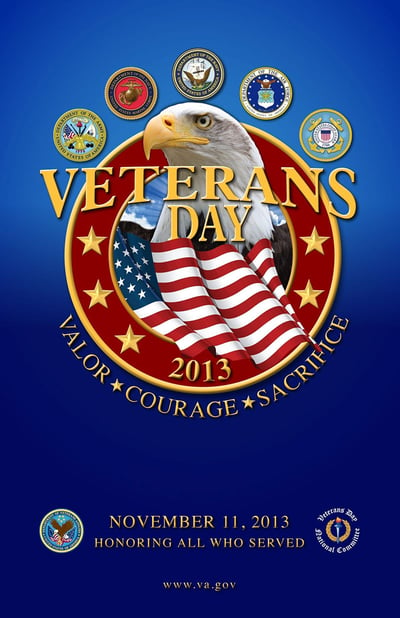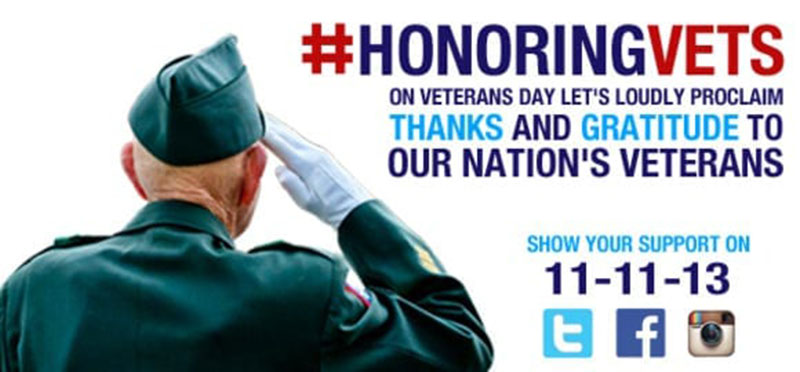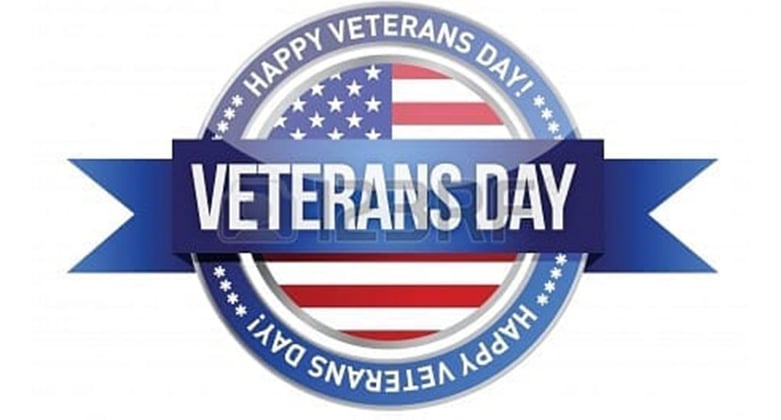 Veterans Day honors the men and women who have served their country. It is also a time to shed light on important issues regarding vets, particularly health care.
Veterans Day honors the men and women who have served their country. It is also a time to shed light on important issues regarding vets, particularly health care.
(Photo, inset right) VETERANS DAY: Veterans have many health care needs that demand attention & action. Photo: VA.gov
The UMHS Pulse takes a look at areas of concern for American veterans.
2013 Survey Statistics for Veterans
The 2013 Survey by the nonprofit, nonpartisan organization IAVA, the Iraq and Afghanistan Veterans of America, reveals alarming figures. Following are some of the survey’s highlights.
The VA Claims Backlog Continues to be a Major Challenge
- 30% of respondents were physically wounded in service: 79% received a disability rating, 77% have a rating of 50% or greater
- 40% have a VA disability claim pending: 74% have been waiting for more than 120 days, 45% have been waiting more than a year
- 36% have appealed a VA claims decision: 40% not satisfied with the outcome of the appeal
Suicide is the Most Important Issue Facing Iraq & Afghanistan Veterans
- 64% have veteran friends who they feel need care: 91% suggested getting care
- 30% thought about taking their own lives: 45% know someone who attempted suicide
- 50% had someone suggest they seek care: 19% did not seek care
- 80% don’t think veterans are getting the care they need for mental health injuries
- 93% are aware of the VA’s Veterans Crisis Line: 37% would use the line if they were feeling suicidal
Women Veterans are Not Getting the Care They Need
- 62% of female respondents have a neutral/negative view of the VA’s care and treatment of Women Veterans: 52% reported no contact from the VA regarding female-centric VA services and benefits
- 41% did not have a positive view of the VA, 20% feel that the VA does not care
- 32% report they don’t see doctors that specialize in women’s care

#HONORINGVETS: Send a tweet with the hashtag #honoringvets today. Photo: #Honoringvets
Health Issues for Veterans
Good Charity Inc.’s website lists negative health outcomes as being one of the most crucial things veterans face in 2013, and that one third of the U.S. population is eligible for some form of veteran’s benefits.
 Mental health is one problem that needs to be addressed.
Mental health is one problem that needs to be addressed.
“Mental illness among military personnel is also a major concern,” Good Charity Inc’s website says. “In another study of returning soldiers, clinicians identified 20 percent of active and 42 percent of reserve component soldiers as requiring mental health treatment. Drug or alcohol use frequently accompanies mental health problems and was involved in 30 percent of the Army’s suicide deaths from 2003 to 2009 and in more than 45 percent of non-fatal suicide attempts from 2005 to 2009.”
(Photo, inset right) ONLINE HELP FOR VETS: Many websites offer resources for men & women who served their country. Photo: 123rf.com
Drug and alcohol abuse and Post Traumatic Stress Disorder (PTSD) are all major concerns.
“Prescription drug abuse doubled among U.S. military personnel from 2002 to 2005 and almost tripled between 2005 and 2008, but alcohol abuse is the most prevalent problem and one which poses a significant health risk,” Good Charity Inc. says. “A study of Army soldiers screened 3 to 4 months after returning from deployment to Iraq showed that 27 percent met criteria for alcohol abuse and were at increased risk for related harmful behaviors (e.g., drinking and driving, using illicit drugs).”
PTSD affects 1 in 5 Iraq conflict veterans. PTSD sufferers “account for 20% of all suicides among military veterans.”
“PTSD may have been impacting veterans’ physical health as well as their mental health,” Good Charity says. “Male twin Vietnam veterans with post-traumatic stress disorder (PTSD) were more than twice as likely as those without PTSD to develop heart disease during a 13-year period, according to a study supported by the National Institutes of Health.”
The Center for Public Integrity reported in an August 28, 2013 article, “Health Care Costs Will Mushroom as Injured Veterans Age”, that improved battlefield medicine is helping more vets survive, but questions whether the Veterans Affairs Department is prepared to handle the costs of health care.
The Center for Public Integrity’s article points out the following:
- “No government agency has calculated fully the lifetime cost of health care for the large number of post-9/11 veterans of the wars in Iraq and Afghanistan with life-lasting wounds. But it is certain to be high, with the veterans’ higher survival rates, longer tours of duty and multiple injuries, plus the anticipated cost to the VA of reducing the wait times for medical appointments and reaching veterans in rural areas.”
- “Medical costs peak decades later,” Linda Bilmes, a professor in the Kennedy School of Government at Harvard University and coauthor of "The Three Trillion Dollar War: The True Cost of the Iraq Conflict,” says in the article.
- “As veterans age, their injuries worsen over time, she said. The same long-term costs seen in previous wars are likely to be repeated to a much larger extent.”
- “Post-9/11 veterans in 2012 cost the VA $2.8 billion of its $50.9 billion health budget for all of its annual costs, records show. And that number is expected to increase by $510 million in 2013, according to the VA budget.”
Online Resources for Veterans
U.S. Department of Veterans, Veterans Health Administration
The website covers everything from health benefits to home and educational loans, careers, job help and training.
Veterans Crisis Line
The website connects ‘Veterans in crisis and their families and friends with qualified, caring Department of Veterans Affairs responders.”
Paralyzed Veterans of America
The website provides a variety of resources for paralyzed veterans.
Disabled Veterans of America
The website offers resources to help disabled veterans and their families.
Center for Veterans Issues
The website is a great resource for everything from PTSD to traumatic brain injury, mental health issues, and more.
About UMHS:
Built in the tradition of the best US universities, the University of Medicine and Health Sciencesfocuses on individual student attention, maintaining small class sizes and recruiting high-quality faculty. We call this unique approach, “personalized medical education,” and it’s what has led to our unprecedented 96% student retention rate, and outstanding residency placements across the US and Canada. UMHS is challenging everything you thought you knew about Caribbean medical schools.

Scott is Director of Digital Content & Alumni Communications Liaison at UMHS and editor of the UMHS Endeavour blog. When he's not writing about UMHS students, faculty, events, public health, alumni and UMHS research, he writes and edits Broadway theater reviews for a website he publishes in New York City, StageZine.com.















